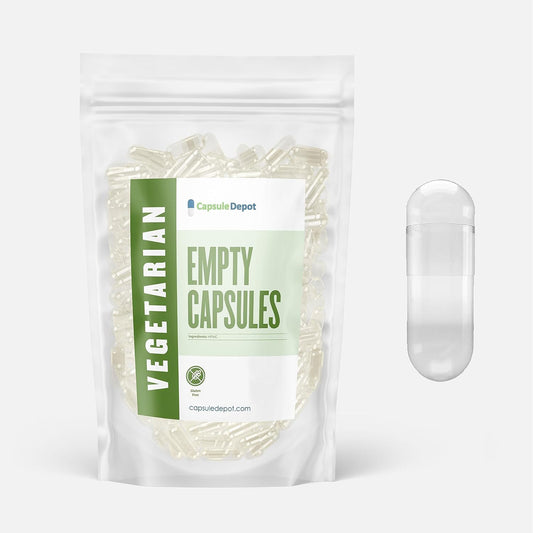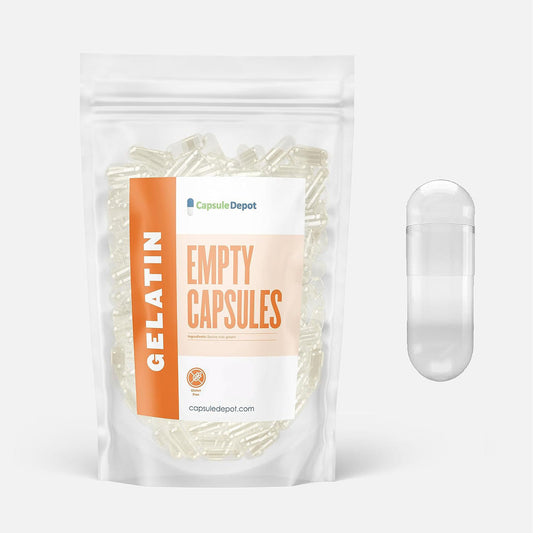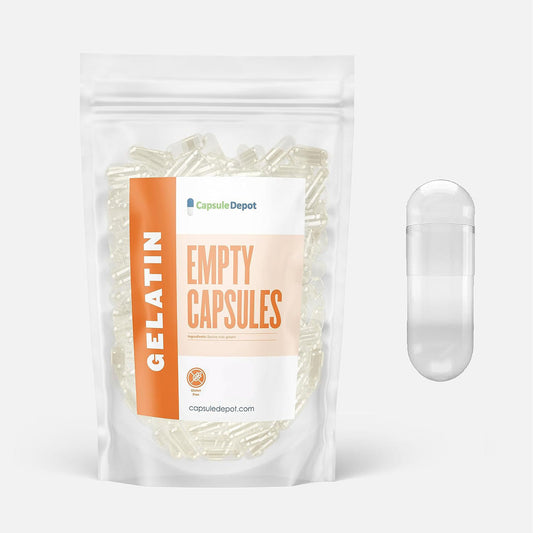In today’s fast-paced world, dietary supplements have become a popular choice to bridge nutritional gaps and support overall health. Yet, despite their prevalence, a range of myths surrounding supplements continues to create confusion. At Capsule Depot, we aim to clarify these misconceptions by providing accurate, evidence-based insights on supplement quality, capsule types, and their true benefits. This guide will explore and debunk common myths, giving you a well-informed approach to choosing the right capsules for your needs.
Myth #1: All Supplements Are Created Equal
Not all supplements are created with the same level of quality. Some products use inferior ingredients, fillers, or low-quality capsules that impact absorption. High-quality capsules are designed to deliver optimal doses of the nutrients they contain. For instance, vegetarian capsules and gelatin capsules vary greatly in their sources, materials, and benefits.
Gelatin Capsules: These are made from animal-derived gelatin, offering a cost-effective and readily available solution for encapsulation. Gelatin capsules are often preferred for their faster dissolution and bioavailability. However, they are unsuitable for vegetarians or those with dietary restrictions.
Vegetarian Capsules: Composed of plant-based materials, such as hypromellose (HPMC), are an excellent alternative for those avoiding animal products. They have a slower dissolution rate, which is beneficial for delivering active ingredients to targeted areas within the digestive system.
Choosing a reliable yet affordable capsule supplier, like Capsule Depot, ensures that you’re purchasing capsules with high-quality standards. This matters significantly for absorption, efficacy, and ultimately, the results you achieve.
Myth #2: Empty Capsules Have No Benefits
Empty capsules are often overlooked, but they serve critical purposes for those customizing supplements to their needs. Empty capsules allow for precise control over the contents, ensuring only the desired nutrients are included and avoiding unnecessary additives.
For example, some consumers opt to create their own blends using single-ingredient powders to suit specific health needs, using empty capsules to combine nutrients that might otherwise be hard to consume. Customizing supplements with empty capsules can be especially beneficial for:
- Allergen Avoidance: Individuals with allergies to fillers and binders in pre-made capsules can create cleaner formulations.
- Dose Control: Empty capsules enable precise control over nutrient dosages.
- Combination Freedom: Tailoring multiple nutrients into one dose without synthetic additives provides a pure supplement solution.
With Capsule Depot’s selection of empty gelatin and vegetarian capsules, consumers have the flexibility to craft personalized supplements that fit their unique health requirements.
Myth #3: All Supplements Work the Same for Everyone
The idea that one supplement fits all is a major misconception. Nutritional needs vary based on age, health conditions, dietary preferences, and individual absorption rates. Therefore, it’s critical to select supplements designed to target your specific needs, rather than assuming any formula will be effective.
Some people benefit more from supplements due to genetic factors or underlying deficiencies. For instance, if you have a B12 deficiency, taking a multivitamin may not suffice, whereas a specialized B12 supplement in a high-quality capsule might be essential. Consulting a healthcare provider and opting for reputable sources that offer certifications, and transparency can make a difference in the outcomes you experience with supplements.

Myth #4: Supplements Are Only Necessary for Nutrient Deficiencies
While supplements are often associated with addressing deficiencies, they are also valuable for maintaining optimal health, enhancing athletic performance, and preventing potential health issues. Common supplements, such as antioxidants, omega-3 fatty acids, and probiotics, offer benefits that support overall wellness, even when deficiencies are not present.
For example, Omega-3 supplements can support heart health and reduce inflammation, while probiotics promote a balanced gut microbiome. Both contribute to long-term wellness and are useful regardless of deficiencies. At Capsule Depot, we recommend integrating supplements with your health goals in mind and choosing high-quality capsules for safe and effective delivery.
Myth #5: Vegetarian Capsules Are Less Effective Than Gelatin Capsules
A popular myth suggests that vegetarian capsules are less effective than gelatin capsules. However, the choice between the two often depends on personal preferences and dietary restrictions rather than effectiveness. Vegetarian capsules are a reliable alternative, providing the same benefits as gelatin capsules in terms of absorption and stability.
At Capsule Depot, we ensure that both types of capsules are optimized for bioavailability. In fact, some studies indicate that vegetarian capsules may be more beneficial for specific delivery needs due to their slower release properties. For consumers adhering to vegan or vegetarian diets, these capsules are an ideal way to maintain alignment with personal values without compromising on quality.
Myth #6: Supplements Can Replace a Healthy Diet
Dietary supplements are designed to complement a balanced diet, not replace it. While supplements can provide critical nutrients lacking in modern diets, they are not substitutes for a diet rich in whole foods. Nutrients from fruits, vegetables, and lean proteins offer a complexity of vitamins, minerals, fiber, and phytonutrients that supplements alone cannot replicate.
Supplements are most effective when used to address specific deficiencies or enhance overall wellness as part of a holistic approach. For example, Vitamin C in a capsule format can support immune health, but pairing it with iron-rich foods can help your body maximize its benefits.
Myth #7: More is Better
Another common misconception is that taking larger doses of supplements will yield better results. However, excessive intake can be harmful and may lead to toxicity, particularly with fat-soluble vitamins like Vitamins A, D, E, and K. Always follow recommended dosages and consult with a healthcare professional to avoid potential adverse effects.
High-quality empty capsule providers, like Capsule Depot, emphasize accurate labeling and dosage recommendations. By following proper guidelines, you can enjoy the benefits of supplements without the risk of overconsumption.

Choosing the Right Capsule: Why Quality Matters
The type of capsule you choose for your supplements can have a significant impact on their efficacy. At Capsule Depot, we offer gelatin and vegetarian capsules with a focus on purity, safety, and superior delivery. High-quality capsules ensure that the nutrients within are absorbed efficiently and reach the target areas in your body.
Benefits of Choosing Quality Capsules:
- Enhanced Bioavailability: Higher-quality capsules break down more effectively in the digestive system, increasing the absorption of nutrients.
- Reduced Allergens: Premium capsules from reputable suppliers are free from common allergens and fillers that can hinder absorption.
- Customization Options: With empty capsules, you have the flexibility to create a personalized supplement routine that meets your health goals.
Conclusion: Making Informed Choices About Supplements
Choosing the right supplements involves more than simply buying the first bottle you find. Understanding common myths and the truth about supplements, capsules, and quality will help you make better health decisions. At Capsule Depot, we provide a range of capsules designed to support your unique health needs and goals, helping you achieve optimal wellness safely and effectively.





